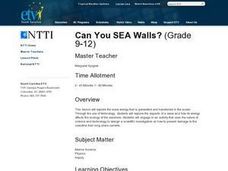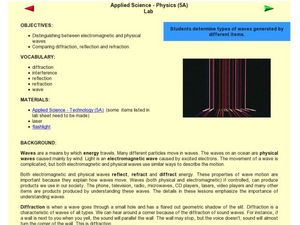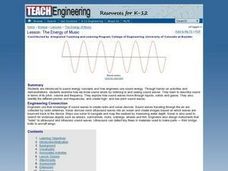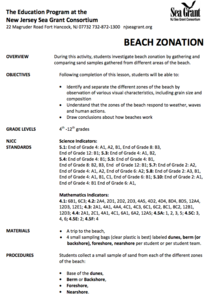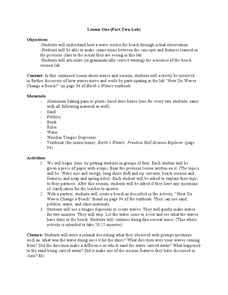Curated OER
Energy Motion in the Ocean
Learners explore the wave energy that is generated and transferred in the ocean. Through the use video and the Internet, students explore the aspects of a wave and how its energy affects the ecology of the seashore.
Curated OER
Waves and Currents
Students are introduced to the forces that are responsible for generating waves in the ocean and how these forcesf differ from those that cause currents. They are able to explain how water molecules in a wave do not move in the direction...
Curated OER
Can You SEA Walls?
Students explore how wave energy that is generated and transferred in the ocean. They explore the aspects of a wave and how its energy affects the ecology of the seashore. Students engage in an activity that uses the nature of science...
Curated OER
Wave Math
Students identify the different factors affecting the size and shape of ocean waves. In this math lesson, students calculate wave speed and wavelength given a mathematical formula.
NOAA
Waves
Is it possible to outrun a tsunami? After watching a presentation that explains how waves and tsunamis occur, class members investigate the speed of tsunamis triggered by an earthquake.
Curated OER
Ocean Power
Students explore the energy resources of the ocean. In this energy lesson, students participate in 4 activities focused on energy resources from the ocean.
Curated OER
Seeing and Feeling Sound Vibrations
Groups rotate through a series of stations and work with a partner to observe sound waves. Children describe sound in terms of pitch, volume, and frequency. To apply their new knowledge, the class considers how these observations can...
University of Southern California
Wave Erosion Lab
Using a stream table, erosion enthusiasts examine how the density of sediment and how the slope of land contribute to the amount moved by waves. You will not be able to use this entire resource as is; there are teachers' names and...
Curated OER
Electromagnetic and Physical Waves
Students compare and contrast electromagnetic and physical waves. In this wave lesson plan, students discover that all waves reflect, refract, and diffract energy. Students work in small groups to experiment with waves and evaluate the...
Curated OER
Waves : An Alternative Energy Source
High schoolers evaluate the feasibility of wave energy as an alternative source of energy. In this alternative energy source lesson students are introduced to renewable and nonrenewable energy and study energy production.
Curated OER
Properties of the Ocean
Students participate in a problem-solving activity, that includes Internet research, about how energies such as currents, waves, tides, etc. affect the ocean.
Curated OER
The Energy of Music
Students discover how engineers use sound energy. They participate in hands-on activities in which they discover how we know sound exists. They identify different pitches and frequencies as well.
Curated OER
Beach Zonation
Young scholars investigate the characteristics of the beach environment and explore beach zonation. After gathering samples from different areas of the beach, students discuss how the beaches work and the characteristic of each zone....
Curated OER
Making Waves: A Study of Earthquakes and Tsunami
Students examine plate tectonics and the causative effect of earthquakes. In this tectonics lesson plan students differentiate between the types of energy waves that cause earthquakes and tsunamis and how waves travel at different...
Chicago Botanic Garden
Albedo, Reflectivity, and Absorption
What is reflectivity, and what does it have to do with the Earth's climate? As reflectivity is measured by albedo, scientists can gather information on Earth's energy balances that relate to global warming or climate change. Budding...
Curated OER
Ocean Currents and Sea Surface Temperature
Students use satellite data to explore sea surface temperature. They explore the relationship between the rotation of the Earth, the path of ocean current and air pressure centers. After studying maps of sea surface temperature and ocean...
Curated OER
How Do Waves Change a Beach?
Students conduct an experiment on beach erosion. In this earth science lesson, students create a beach model and use tongue depressor to produce waves. They write a journal about their observations.
Curated OER
Lesson one
Pupils study waves and how it erodes a beach. In this energy instructional activity students complete a lab activity on waves and tides.
Curated OER
In the Eye of the Storms
Tenth graders study the major hurricanes of the Atlantic Ocean. In this weather lesson, 10th graders read an article and answer various questions. Students discuss their findings with their classmates.
Curated OER
Conditions at Sea
Students examine wave formation. In this wave lesson plan, students discover how waves are formed and how the weather at sea is predicted. Students study ocean vocabulary and understand the Beaufort Wind Force Scale.
Curated OER
Salt Marsh in a Pan
Students create a model of a salt marsh to discover the impact of pollution and human activities on water-based habitats including bays and the ocean. They recognize the relationship between natural and developed areas. Students impact...
Curated OER
Let's Make Waves
Young scholars investigate the concept of waves and how they are formed. The force of wind is demonstrated as the prime factor to the creation of ocean waves. Students research the concept in detail for better comprehension.
Curated OER
Ocean Microstructure Lesson Plan
Learners explore the microstructure of the ocean by analyzing graphs created by Dr. Mike Gregg of the University of Washington Applied Physics Laboratory during the EPIC 2001 research cruise on the Ronald H. Brown NOAA vessel.
Curated OER
Gifts from the Sea
Students investigate parts of the ocean. In this seaweed instructional activity, students identify foods that contain seaweed, parts of seaweed, and how the ocean affects our lives. As a class students brainstorm ways we rely on the...


